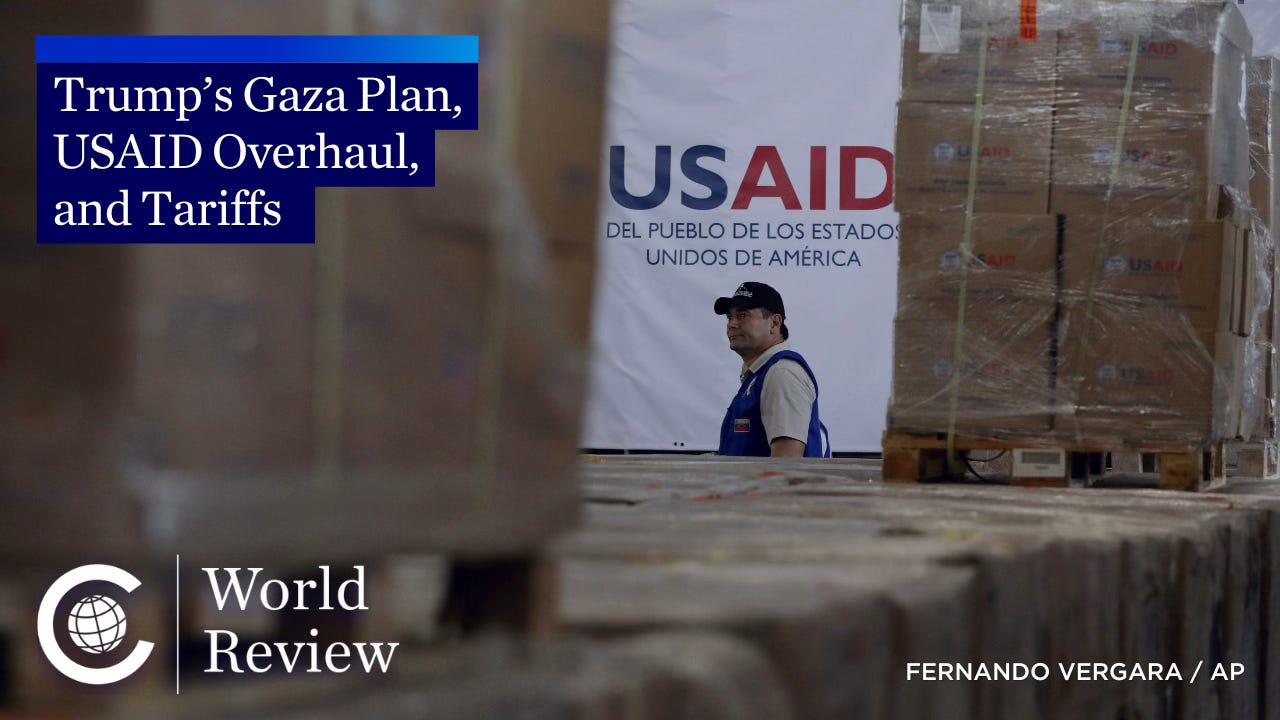World Review: Trump’s Gaza Plan, USAID Overhaul, and Tariffs
A brief synopsis of this week's show
Each Friday morning, I host a video podcast called “World Review with Ivo Daalder” where three journalists from major news outlets around the world join me in discussing the latest global news stories of the week.
This morning, January 31, we tried to make sense of Trump’s plan to own Gaza, the dismantling of the US Agency for International Development, and tariffs on America’s neighbors with Nahal Toosi of Politico, David Lunhow of the Wall Street Journal, and Peter Spiegel of the Financial Times.
“World Review is always fascinating. I love the fact that you can get journalists from around the world to participate since zoom is the medium.”
— A Subscriber to America Abroad
While I encourage you to watch or listen to the episode (and subscribe wherever you get your podcasts!), here are a few interesting things I took away from our discussion:
On Tuesday, President Trump shook the world by announcing the United States would “own” Gaza and build a Riviera on the Mediterranean. On Wednesday, his aides went on TV and to Capitol Hill and try to walk it back. On Thursday, Trump doubled down: Israel will turn over Gaza to the United States once the fighting has ended. There, in a nutshell, you have the craziness of this week. Where did this come from? What is the bigger idea behind it? How would it work? David tried to make sense of it all, but wasn’t sure you can. The Gaza ownership idea comes after weeks in which Trump said he would “get” Greenland, “take over” the Panama Canal, and turn Canada into the “51st State”—ideas more suitable to large 19th century imperialism than the 21st century world. Who stands to gain from this idea? The Israeli far-right has long wanted the occupied territories emptied of Palestinians, annex Gaza and the West Bank, and recognize Jordan as the real Palestine. Trump has given those dreams new life. But what about the 5 million Palestinians in these lands (let alone the 2 million Arab Israelis)? How do your force them out? Trump, of course, was silent on the details. Which have let some to suggest he isn’t really serious—that his out-of-the-box thinking is designed to stimulate new ideas. But there is a reason why the Palestinian issues has remained unresolved. It isn’t for lack of big ideas. It’s that two peoples want the same land and they haven’t been able to agree on a division of land between them.
One U.S. government agency that would be expected to help reconstruct Gaza is the U.S. Agency for International Development. But this week, Elon Musk’s purge of the federal government extended to USAID. More than 10,000 workers were told to go home. The agencies doors were locked. Its website went dark. USAID is
effectively no more. Nahal explained what this meant for global aid efforts. USAID is essentially the core of the entire international assistance effort—it’s the hub around which the entire system is built. As the largest aid donor in the world, this agency coordinates the efforts of UN, national, and non-governmental agencies for addressing famine in Sudan, refugees in Syria, civil society efforts in Russia, disease outbreaks in Central Africa, and so much more. With the agency shut, that coordination is gone and so is the effort to help millions of people in dire needs. “People will di,” Nahal said. “They have already died” because of these decisions. AID was created in 1961 by John F. Kennedy to provide a western answer to the Soviet’s anti-colonial message. It was the soft power that convinced people that the US and its western friends had their interests at heart—in ways the Soviet Union then, and China now, has never done.
Finally, we focused on Trump’s tariff war against not only America’s biggest adversary but also its two immediate neighbors. On Tuesday, 10% tariffs went into effect on Chinese imports. The 25% tariffs on Mexican and Canadian imports were postponed at the last minute for 30 days. Peter suggested that the tariffs against Canada made no sense. Few immigrants and even fewer drugs cross into America through the northern border, so imposing tariffs to cut off a non-existent flow wasn’t going to have any impact. Except in Canada, where Trump’s threats have discombobulated the political scene as everyone across the political spectrum turns against Trump. The Liberal party is moving up in the polls, making the leadership election there far more interesting than it was when Justin Trudeau announced he was stepping down. And the Conservative Party, led by Pierre Poilievre, who has styled himself as a mini-Trump, is losing luster just as new elections are around the corner. Tariffs on Mexico are more understandable, given the large flux of immigrants and much of the drug trade coming across the border. On the former, Mexico can do more to stem illegal crossings. But as David explained, the Mexican government has no ability to control the flow of drugs. A third of the country is controlled by cartels and the state is not able to get control over them, tariffs or no tariffs.
That’s it for my quick takes of this week’s episode here on America Abroad. To get the full flavor, please listen to the episode itself.






